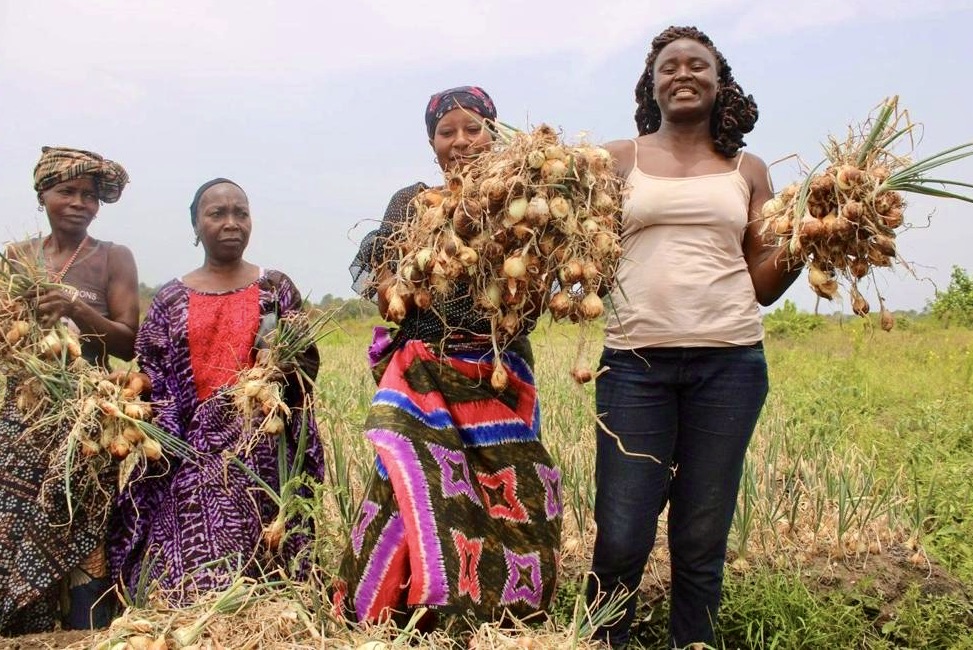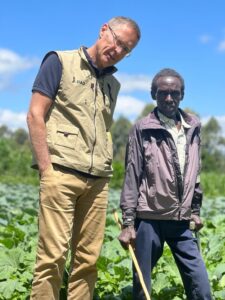Français English
The role of smallholder farmers in agricultural transformation

by Donal Brown, Associate Vice President, Programme Management Department, IFAD
African agriculture is predominantly about smallholders. The transformation of African agriculture is thus first and foremost about how these tens of millions of women and men farm, fish, or raise their livestock. It is about their livelihoods and their relationship with the environment and with markets. It is about whether or not they can realize their aspirations as small entrepreneurs, and through that, their aspirations for their families and their future. Today, Africa’s smallholders and agricultural workers are disproportionately represented among those living in extreme poverty and food insecurity. But they are also at the forefront of change across African food systems.
At the International Fund for Agricultural Development, where I lead the Programme Management Department, we invest with governments and partners in the capacity of smallholders to lead sustainable and inclusive transformation on their farms, in their communities and in their countries.
For those who work in agricultural development, sustainable transformation means specific things: increased crop and livestock productivity, healthier soils, more resilient ecosystems, higher incomes, better nutrition impact, climate adaptation, and so forth. As the agenda of agricultural transformation has taken on a broader food system connotation in recent years, aspects related to nutrition, livelihoods, resilience and sustainability have become at least as prominent as more traditional aspects such as productivity and incomes. The 2021 African Common Position on Food Systems clearly reflects this broadening of focus.
Overall, this is a complex agenda, with a lot of different pieces that need to align. It rests on a combination of good policies and policy implementation, well-functioning public services and institutions – including at the “last mile,” and farmers’ access to right-fit technology, information, infrastructure (especially energy and transportation), financial services and markets. At IFAD, we have learned that while we can contribute to investments in all these areas, ultimately the driving role rests with smallholders, communities, and local institutions.
In my frequent travels across African countries, I often have the privilege of listening to farmers, rural women’s groups, and rural entrepreneurs – often particularly young entrepreneurs. This is when I get to see what sustainable and inclusive agricultural transformation looks like.
Here are two examples from my travels in the past year.
In Sierra Leone, I met women entrepreneurs from the Kafubulom Onion Growers Federation, which includes about 900 women farmers organized into 30 small groups in the Port Loko district in Northern Sierra Leone. In recent years, these farmers cultivated about 10 ha of land with mostly rudimentary tools. Through support from the IFAD COVID-19 response Rural Poor Stimulus Facility, the size of cultivated land expanded to 25 ha, and production levels increased tenfold – from around 100 to 1000 50kg bags of onions, with longer shelf life thanks to access to post-harvest equipment. This improvement in productivity and shelf life has enabled the Federation to establish a profitable relationship with PCS, a leading food product marketing and distribution company in Sierra Leone. Profits from onion production have allowed some of these women to start other small businesses, with multiple positive returns on the local economy but also on nutrition and on their children’s education. Also in Sierra Leone, the Facility has supported the Forward Women with Disabilities Organization to access seeds and other inputs as well as labour for vegetable production and commercialization, with similar multiple positive impact.
Key success factors in these stories have included support to women’s access to inputs and, in some cases, mechanized implements such as mini power tillers, curing and drying machines coupled with back-up power generators, and post-harvest infrastructure. However, none of this would have made the difference that it has in the absence of these rural women’s entrepreneurship and the support of communities and local institutions.
In Kenya, I was similarly inspired by communities supported by the Upper Tana Catchment Natural Resources Management Project, which IFAD co-funded with Government and with the Spanish Trust Fund in the past decade. The project aimed at a combination of sustainable management of water, forests and other natural resources and promotion of food security and better incomes for low-income smallholder households – an example of a multi-pronged “transformation” agenda. As in the case of Sierra Leone, the project pursued this with a combination of hard and soft investments – in infrastructure, capacity development, financing, and institutional development. The aim was to reach over 1 million people.
An IFAD impact assessment of the Upper Tana project last year showed an increase in crop productivity of 50-60% among participating farming households, an increase in their incomes of over 40% and an increase of household resilience of 13%. By May 2022, over 40,000 households had adopted sustainable and climate-resilient technologies and practices, and over 2000 ha of land had been brought under such practices. Over 2500 ha of land had been brought under efficient water-related infrastructure, water chemical pollution had been reduced by 20%, and the distance that (generally women) need to travel to fetch water declined. The reduction of water loss resulting from improved practices and infrastructure led to increasing river base flows by 200%. All this was achieved through financing but also through empowering community institutions – including over 300 communities developing natural resource management plans. An Endowment Fund was also established, with contributions from the private sector, to support activities around these plans.

In conclusion, African agricultural transformation is a complex and urgent agenda, particularly for millions of smallholders living in poverty and food insecurity. But it is also already a reality across the continent, often led by smallholders. Measuring up to the entrepreneurial spirit of these women and men, many of them youth, is how we should measure success in advancing this transformation. The AATI is a unique opportunity for actors within and beyond the continent to come together to support African smallholders to lead change. It is this spirit that inspires IFAD as an AATI founding partner and as its host for the coming years.